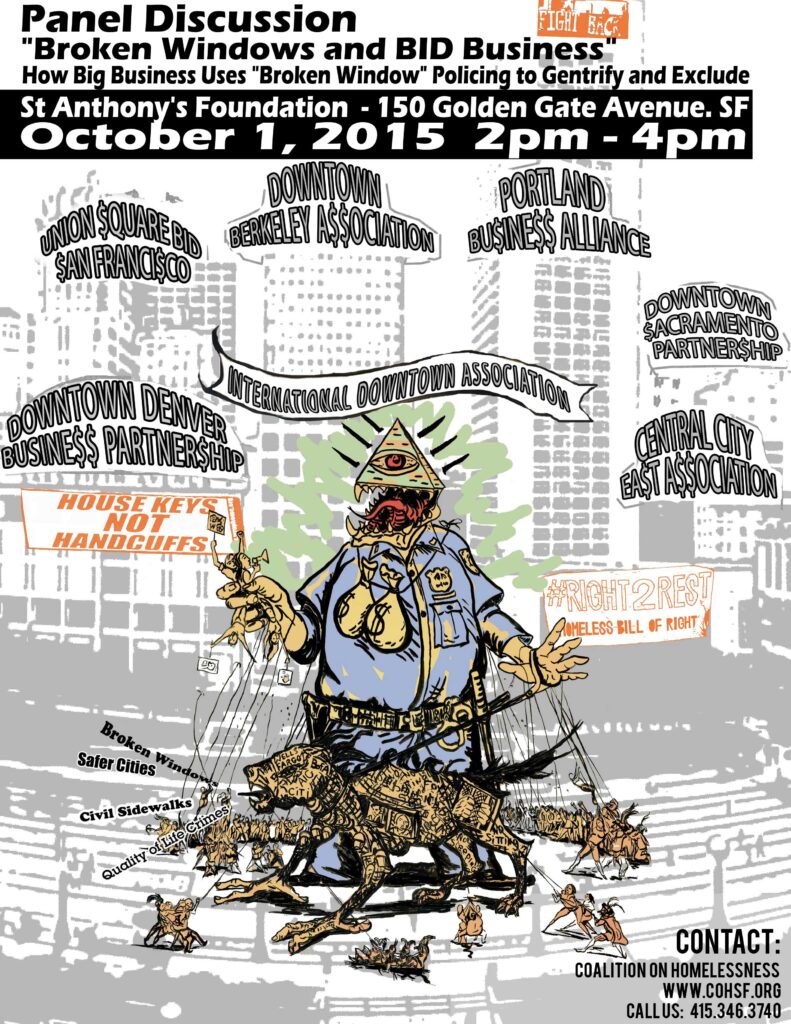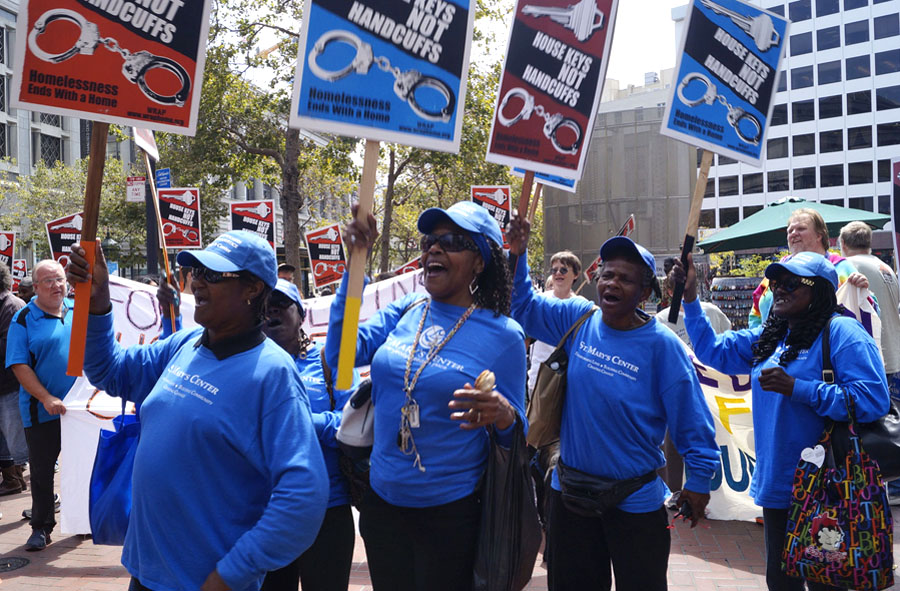Grossman offers a frank opinion of why BIDs aim to move homeless people out of business districts. “It’s a customer service district. They don’t see the homeless people as customers… If they don’t see you as a customer you are in trouble… You are either a customer or a contagion.”

A Panel Discussion
Thursday October 1, 2015 — 2-4pm
St. Anthony Foundation— 150 Golden Gate Ave. SF 94102
Liz Brown, UC Berkeley: Urban policing and the impacts on our communities
Shayla Meyers, Los Angeles Legal Aide: Lawsuits against the BIDs
Organizers from San Francisco, Oregon and Colorado: Strategies for building a movement
Imagine a government where voting power is in direct proportion to the value of the property one owns, where majority ownership gives one the right to appoint the leaders, and where small businesses and homeowners don’t have a voice. Imagine a place where people without homes are exiled from the community.
You might think this is still a dystopia to come (after a few more Supreme Court decisions granting corporations ever more rights as persons), but unfortunately, it’s already a reality in hundreds of cities across the United States in so-called Business Improvement Districts (BIDs).
BIDs are private corporations governed by business property owners in a particular geographical region. They are chartered by state law and approved by local jurisdictions where they take over many functions once served by local government. Better street cleaning, trash removal, street signage, streetscape improvements, and other maintenance tasks are part of the sales pitch that BIDs make to convince city officials to give them taxing power over commercial property within a district.
BIDs are also typically empowered to hire poorly trained and poorly paid security guards to push undesirable people out of the area — supposedly the criminal element, but more often poor and homeless people who big business has decided aren’t good customers.
Marcus Harris, director of Cities of Refuge in Denver, Colorado, characterizes the approach of BIDs: “According to the Business Improvement District, quality of life is more access to Macy’s and all these other shops without having to step around people and deal with human suffering.”
The creation of the improvement districts gives the big businesses that already dominate local politics through the Chambers of Commerce and political donations another mechanism for changing city policies to reflect their interests.
Homeless people are the first to feel the brunt of these privatization and gentrification initiatives, but low-income tenants soon discover that they too are being pushed out of these areas.
While incumbent homeowners may be the beneficiary of a brief boom in the value of their homes, new families trying to move from apartments to houses are likely to be driven out into the periphery, further degrading the diversity of our communities.
“We are back to the days of Jim Crow laws and Anti-Okie laws,” says Lisa Marie Alatorre of the San Francisco Coalition on Homelessness. “The BIDs are promoting discriminatory policing practices to simply remove people deemed unwanted from certain parts of town.”
Origin of Business Improvement Districts
The first significant governance by Business Improvement Districts in the United States came in the wake of the governmental collapse in New York City in the 1970s. Grand Central Station and other key mercantile hubs were given over to privatized governance.
BIDs are granted the power to assess commercial property owners within a district with what amounts to a real estate tax, collected on their behalf by the local government. In some cases, they take on the land use planning and capital investments typical of government.
In California, a BID can be created with the support of 51 percent of the business taxpayers in a district, but voting power is based on the tax paid, not the number of businesses in the district.
Even though they are privately managed entities, BIDs control millions of dollars of public tax revenues and expenditures, ranging from $18,000 at the lowest end to over $27 million for the San Francisco Tourism Improvement District. California leads the country in BIDs, with almost 250 districts in downtown and suburban areas throughout the state.
While most BIDs file some sort of report to their city council once a year, research into the actual practice shows that councils are uncritical of plans created by the business-led board of the private BID and rarely if ever overrule them.
BIDs are quickly spreading from state to state and laying the groundwork for ever more direct corporate governance at the municipal level.
According to a 2011 report based on a census conducted by the International Downtown Association and professors Carol Becker and Seth Grossman, there were over 1000 BIDs in the United States and their numbers are growing rapidly.
Grossman, the founder and director of the Rutgers’ Institute of Business District Management, told me he sees business districts as improving government accountability by shifting the taxing and spending decisions about a neighborhood to a level closer to those who have a stake in it — the business owners. They act, in effect, as a political action group.
“Prior to the ‘50 and ‘60s, the Chamber of Commerce was a political organization,” he said. “In fact, almost all elected officials were put forth by the Chamber of Commerce. Business and government were almost hand-in-glove, way more than it is now. Business people, because of suburbia, began to move out of the urban areas… and they couldn’t vote and they couldn’t run for office. So they lost their political power in town.”
‘You’re Either Customer or Contagion’
In San Francisco, Oakland and Berkeley, the BIDs that control and patrol the downtown city centers have aggressive anti-homeless policies enforced in a joint effort with local police departments.
The City of Berkeley’s harassment of homeless people hit new lows in March 2015 when “ambassadors” employed by the Downtown Berkeley Association (DBA) were caught on video assaulting homeless people as the City Council launched a new campaign to criminalize homelessness. In a widely viewed YouTube video taken March 19, 2015, Berkeley ambassadors beat two homeless men after they chased them off the main street and into an alley. [See Street Spirit, April 2015.]
Grossman offers his frank opinion of why BIDs aim to move homeless people out of the districts. “It’s a customer service district,” he said. “So they are concerned about customers. They don’t see the homeless people as customers… If they don’t see you as a customer you are in trouble… You are either a customer or a contagion.”
While granting that BIDs don’t represent the whole population, Grossman sees them as an improvement over bribery through campaign contributions. “[If] all they can do is ‘pay to play,’ then it becomes so self-centered. They don’t have any overall community interests. They are just trying to save their own ass or their business.”
Grossman sees BIDs as a way of reconnecting business and government. “Aren’t they getting the ear of the mayor almost the way the old chambers of commerce did? Chambers of commerce are flaccid, but BIDs are exerting more and more political power. They are a public private-partnership.”
BIDs Lead Anti-Poor Campaigns
The Downtown Berkeley Association has been doing an aggressive job of organizing for what they see as their collective interest. In mid-March, a package of anti-homeless ordinances backed by the DBA went before the City Council in an underhanded effort to revive the core of the so-called “sit-lie” law that Berkeley community organizations convinced voters to reject just two years earlier.
In that campaign, Downtown Berkeley Association CEO John Caner was named in a complaint, eventually sustained by the Fair Political Practices Commission, for campaign finance violations that included paying $5,530 in $100 and $50 cash payments to homeless and formerly homeless “poll workers” and deceiving them into handing out slate cards urging a vote for the measure that would have criminalized them.
BIDS and Civil Rights
Caner’s latest attempt to influence the Berkeley City Council to adopt a series of new anti-poor laws has been delayed thus far by street protests and interventions by local faith leaders and other civil rights advocates. But BIDs across the state are maintaining constant pressure to deprive homeless people of human and civil rights.
In Los Angeles, years of successful legal challenges brought by community organizations such as the Los Angeles Community Action Network (LACAN) and legal groups like the ACLU overturned five different sleeping bans and property seizure laws as unconstitutional.
But in June 2015, the L.A. City Council once again passed a set of anti-poor laws targeting homeless people.
And the LAPD is back to business as usual, making sweeps in the Downtown Industrial District Business Improvement District (which is run by the Central City East Association, or CCEA).
CCEA is just one of the many business lobbying groups that is helping itself to local taxing authority in Los Angeles, which now boasts nine BIDs in just the downtown area. Three of them overlap or abut the Skid Row area.
According to Curbed, a news website, LAPD Sergeant Robert Bean told homeless people as he was rousting them, “People pay a lot now to live here, they expect services from the city.” And, of course, the service they are looking for is driving the homeless out of their rapidly gentrifying neighborhoods.
Taking people’s bedrolls, shopping carts, and tents is only the tip of the iceberg when it comes to police actions. LACAN reported in their 2010 study of increased police presence in Skid Row that the so-called Safer Streets initiative — intense “Broken Windows” street enforcement of minor infractions like vagrancy, drinking, drug possession, etc. — leads to a far greater number of encounters between homeless people and police. An astonishing 54 percent of 200 homeless residents of downtown Los Angeles reported being arrested in the previous year.
And with increased police contact comes the predictable excessive use of force that is now widely reported across the country. For example, in March 2015, the LAPD killed a homeless man in Skid Row — recorded on video tape — when they pursued him into his tent, pulled him out of it and shot him dead in front of numerous onlookers and several cameras.
Two months later, on May 5, the police killed another man in Venice who committed the crime of running from police while homeless.
While Los Angeles Police Chief Charlie Beck and Mayor Eric Garcetti make apologetic gestures in public, the L.A. city government banded together with others in the League of Cities to attack the Homeless Bill of Rights and Right to Rest legislation in the state legislature and coordinates their efforts with the Chamber of Commerce.
Right to Rest blocked by League of Cities and BIDs

In California, Colorado, and Oregon, where members of the Western Regional Advocacy Project (WRAP) have been running a campaign to win a “Right to Rest” bill in state legislatures, BIDs working through the California Downtown Association and the business-dominated League of Cities associations worked hard to block the legislation.
One of the more absurd arguments put forward by the California League of Cities warns that ensuring that the Bill of Rights applies to homeless and poor people might result in a homeless person claiming protection under the Second Amendment to defend their tent by force of arms. (This argument was made in a letter to the bill’s sponsor, State Senator Carol Liu).
In a just society, we should not need enabling legislation to extend the Bill of Rights to poor and homeless people. We should all be protected by all constitutional requirements.
In a court case in Boise, Idaho, even the Obama administration’s Department of Justice has signed on to a brief stating that the arrests of homeless people for sleeping were prohibited under the 8th Amendment ban on “cruel and unusual punishment.”
Community groups continue to fight in the courts, the legislature and in the streets. This month, WRAP and other groups are taking the fight to the business community at the next meeting of the International Downtown Association at a major annual conference in San Francisco, September 30 to October 2. (See the accompanying box.)
Paul Boden, executive director of WRAP, vows to take the fight to the BIDs. “This is about commercializing and applying neoliberal economics to our communities and the only way to stop that is to say, ‘hell no, we are fighting back.’”
Origanilly Post @
http://www.thestreetspirit.org/one-dollar-one-vote-big-business-subverts-democracy/



Leave a Reply
You must be logged in to post a comment.